The Virginia lease agreement proclaims the intricacies involved with the bestowing of rights of use for a particular space in exchange for an agreed-upon monthly premium. The drafted filing contains information highlighting the rights of tenant use and any regulations that must be observed during the extended lease period. Endorsements from the lessor and lessee confirm the mutual understanding and commitment to the accord.
Lease Agreements By Type
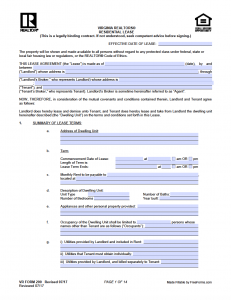 Association of Realtors Version (Form 200) – The Virginia Realtors have created a residential lease agreement that can be utilized by landlords and tenants looking to take part in the rental of a property. (The Hampton Roads Realtors Association also offers a residential lease agreement that may be more applicable to certain areas of Virginia.)
Association of Realtors Version (Form 200) – The Virginia Realtors have created a residential lease agreement that can be utilized by landlords and tenants looking to take part in the rental of a property. (The Hampton Roads Realtors Association also offers a residential lease agreement that may be more applicable to certain areas of Virginia.)
Download: PDF
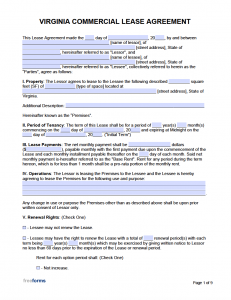 Commercial Lease Agreement – A legal contract assigning the use of a building unit for trade or commerce activity.
Commercial Lease Agreement – A legal contract assigning the use of a building unit for trade or commerce activity.
Download: PDF, Word (.docx)
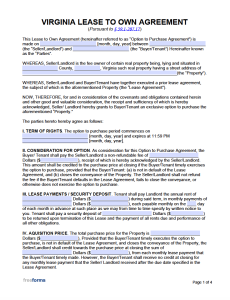 Lease to Own Agreement – Written settlement offering rights of tenancy with an additional option to purchase a property once the rental lease has terminated.
Lease to Own Agreement – Written settlement offering rights of tenancy with an additional option to purchase a property once the rental lease has terminated.
Download: PDF, Word (.docx)
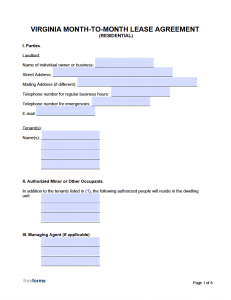 Month-to-Month Lease – An arrangement to exchange payment for the use of a dwelling for a period with an advantage for either lessor or lessee to terminate the remainder of the leasing duration by giving thirty (30) days of prior notification.
Month-to-Month Lease – An arrangement to exchange payment for the use of a dwelling for a period with an advantage for either lessor or lessee to terminate the remainder of the leasing duration by giving thirty (30) days of prior notification.
Download: PDF, Word (.docx)
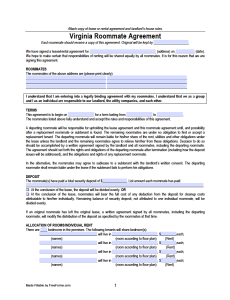 Roommate Agreement – Affirms a pact to rent a room or segment of a home, with shared use of established common spaces for a settled monthly stipend.
Roommate Agreement – Affirms a pact to rent a room or segment of a home, with shared use of established common spaces for a settled monthly stipend.
Download: PDF
Standard Lease Agreement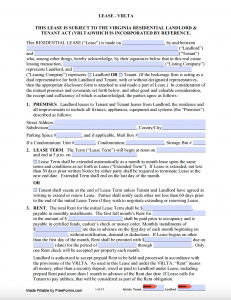 – Verifies the information in reference to the renting of a unit for residential use to an accepted contractual obligation.
– Verifies the information in reference to the renting of a unit for residential use to an accepted contractual obligation.
Download: PDF
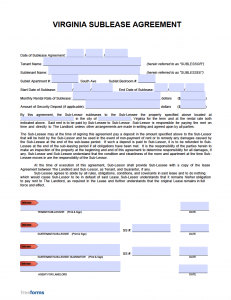 Sublease Agreement – Constitutes a reconciliation of a current tenant to lease a property to an alternate individual for a specified time and dollar amount.
Sublease Agreement – Constitutes a reconciliation of a current tenant to lease a property to an alternate individual for a specified time and dollar amount.
Download: PDF
Additional Forms
Brokerage Relationship to Unrepresented Party Disclosure Statement – If the landlord and/or tenant is being represented by an authorized real estate agent, it is suggested that the represented party deliver this written statement to the other individual(s).
Defective Drywall Disclosure Statement – Landlords of property that contain defective drywall on the premises can disclose this information using this form (no longer legally required).
Guaranty of Lease Agreement (Form 230) – This form allows a non-tenant to essentially co-sign the lease and ensure that they will cover the cost of the rent if the primary lessee does not make a payment.
Pet Addendum – Establishes the number & type of animals that the tenant will possess on the property, what fees will be required, and what the code of conduct will be for the tenancy in regard to pets.
Pool and Spa Addendum – Rental properties that include a pool and/or spa on the premises should incorporate this documentation when fulfilling the lease agreement.
Residential Move-In Move-Out Inspection Report (Realtor Version) – The Virginia Association of Realtors offers residents a detailed report concerning the condition of the property that should be filled in before moving into the dwelling and after vacating it.
Residential Property Management and Exclusive Rental Agreement – Owners/Landlords looking to hire the services of a property manager should fulfill this agreement with the objective of solidifying a proper business relationship.
Residential Rental Consumer Disclosure Information Form – Encapsulates all the state’s required disclosures into one document to assure a legal contract.
Landlord-Tenant Laws
Express statues and guidelines for the legalities surrounding lessor and lessee relations can be examined in the Code of Virginia’s chapter 13 Resident Landlord and Tenant Act (§ 55-217 – § 55-248).
Required Landlord Disclosures
Identification of the Landlord or Authorized Personel – The lease agreement must explicitly include the name and address of all owners of the property. This disclosure additionally extends to any authorized agents of the property management company assisting the owner in the contract (§ 55-248.12)
Utility Payment Structure – To effectively bill a tenant for utility charges, the details involving the ratio of usage must be broken down in the lease. The portion that the tenant is responsible for may be determined by meter measurement, square footage, or by the unit for a property and the method of rendered must be stated therein. Should a fee or deposit be necessary to set up an account or move out, it must be expressed within the lease agreement as well (§ 55-226.2).
Move-In Checklist – The landlord is allotted five days after moving in to furnish an organizational inspection sheet summarizing current damages to the property at the time of occupancy. The tenant can archive this paperwork or disputed within five days (§ 55-248.11:1).
Condo – Regarding multi-family buildings, should an owner apply for a condominium or cooperative permits, all lessees must be notified in writing. If a property is scheduled for demolition or considerable renovations, requiring occupants to relocate, the tenant must receive notice six months before the planned action (§ 55-248.12).
Military Base or Noise Zone – For those properties that lie close to a military airbase, or area deemed as a potential “noise zone” or “accident potential zone”, full disclosure must be expressly given within the leasing document. In the case that disclosure is not carried out, the tenant may have thirty (30) days to terminate the lease (§ 55-248.12:1).
Mold – The lessor must acknowledge in writing any facts concerning viewable evidence of mold contamination within the rental residence. For cases where no mold is detected upon inspection before occupancy but is then found on the property, the lessee has 5-days to inform the lessor. In the case the tenant still would like to continue the lease, the landlord will then have 5-days to arrange to remedy the situation (§ 55-248.11:2).
Lead-Based Paint (42 U.S. Code § 4852d) – Federal law mandates that any residence built before 1978 include a disclosure indicating a potential for exposure to lead-based paint. The form must accompany the lease, and a pamphlet from the US EPA be distributed to signing individuals to be made aware of the seriousness of the potential risks involved.
Previous Manufacture of Methamphetamine on Premises – Any rental space that has been utilized to manufacture methamphetamine must be cleaned appropriately to specifications found in COV Board of Health cleanup requirements (§ 32.1-11.7). Should it not be disclosed, unknown to the landlord, or not cleaned sufficiently to meet state regulations, the tenant will have 60 days to end the lease with no further repercussions or choose to continue with the contract (§ 55-248.12:3).
When is Rent Late?
Virginia does not have regulation in place concerning when a rental payment is considered late or any stipulated grace period.
Late Fees
A fee placed upon a late rental disbursement is only compulsory to be paid when it appears within the signed leasing contract. The amount charged per incident, grace period, and payment protocol should be addressed and clarified within the lease.
NSF Checks
Any check that is returned by a bank to the landlord due to insufficient funds can prompt the tenant to be subject to an additional fee. This expense is obligated to be disclosed within the lease agreement language and can total no more of $50 plus any fees the landlord incurred upon deposit attempt (§ 8.01-27.1).
Security Deposit Maximum
The state of Virginia obligates that the security deposit on a residential home cannot exceed a total of two month’s rent for the property. The amount charged for deposit must be recorded within the leasing materials and return (minus any damages) upon termination (§ 55-248.15:1).
Security Deposit Return
Once the culmination of the lease agreement period has been finalized, the owner will have 45 days from the end of the lease to supply reimbursement of the security deposit to the tenant. For cases involving defects to the property, unpaid rent, or late fees, the landlord must provide a list of all property issues and the remainder, minus the cost of repair or unpaid rent, must be refunded to the tenant within forty-five (45) days (§ 55-248.15:1).
Landlord’s Entry
Access of an authorized agent to the unit for maintenance purposes will be permitted with notification to the tenant twenty-four (24) hours in advance. For certain emergencies, advance notification will not be required to enter the premises (§ 55-248.18).


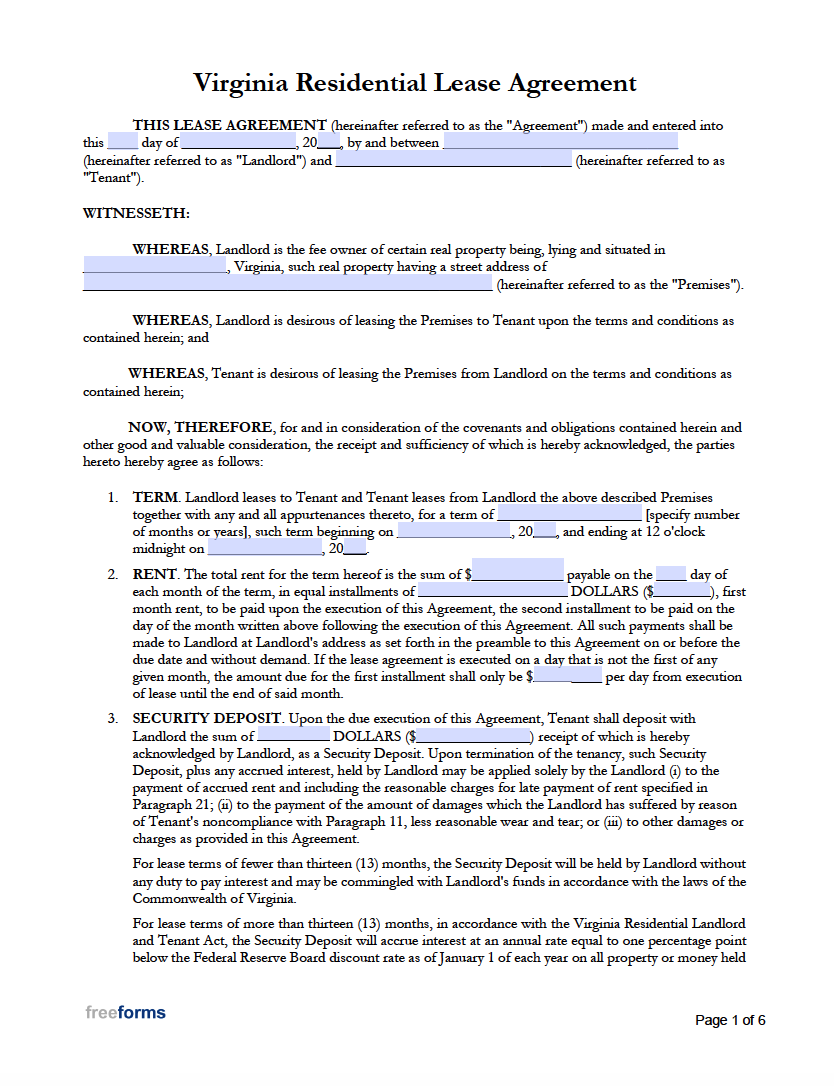
0 comments
Comments are closed.